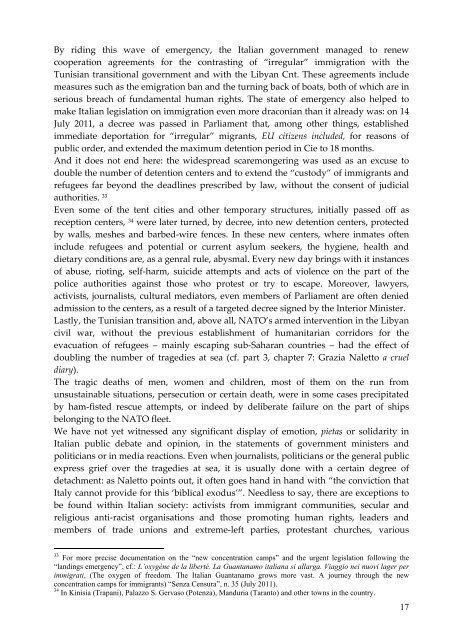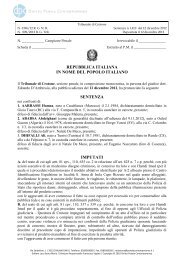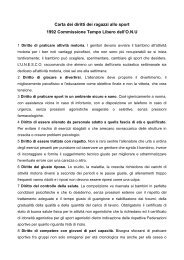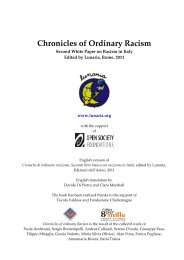Chronicles of ordinary racism 2011 - Cronache di ordinario razzismo
Chronicles of ordinary racism 2011 - Cronache di ordinario razzismo
Chronicles of ordinary racism 2011 - Cronache di ordinario razzismo
- No tags were found...
Create successful ePaper yourself
Turn your PDF publications into a flip-book with our unique Google optimized e-Paper software.
By ri<strong>di</strong>ng this wave <strong>of</strong> emergency, the Italian government managed to renew<br />
cooperation agreements for the contrasting <strong>of</strong> “irregular” immigration with the<br />
Tunisian transitional government and with the Libyan Cnt. These agreements include<br />
measures such as the emigration ban and the turning back <strong>of</strong> boats, both <strong>of</strong> which are in<br />
serious breach <strong>of</strong> fundamental human rights. The state <strong>of</strong> emergency also helped to<br />
make Italian legislation on immigration even more draconian than it already was: on 14<br />
July <strong>2011</strong>, a decree was passed in Parliament that, among other things, established<br />
imme<strong>di</strong>ate deportation for “irregular” migrants, EU citizens included, for reasons <strong>of</strong><br />
public order, and extended the maximum detention period in Cie to 18 months.<br />
And it does not end here: the widespread scaremongering was used as an excuse to<br />
double the number <strong>of</strong> detention centers and to extend the “custody” <strong>of</strong> immigrants and<br />
refugees far beyond the deadlines prescribed by law, without the consent <strong>of</strong> ju<strong>di</strong>cial<br />
authorities. 33<br />
Even some <strong>of</strong> the tent cities and other temporary structures, initially passed <strong>of</strong>f as<br />
reception centers, 34 were later turned, by decree, into new detention centers, protected<br />
by walls, meshes and barbed‐wire fences. In these new centers, where inmates <strong>of</strong>ten<br />
include refugees and potential or current asylum seekers, the hygiene, health and<br />
<strong>di</strong>etary con<strong>di</strong>tions are, as a genral rule, abysmal. Every new day brings with it instances<br />
<strong>of</strong> abuse, rioting, self‐harm, suicide attempts and acts <strong>of</strong> violence on the part <strong>of</strong> the<br />
police authorities against those who protest or try to escape. Moreover, lawyers,<br />
activists, journalists, cultural me<strong>di</strong>ators, even members <strong>of</strong> Parliament are <strong>of</strong>ten denied<br />
admission to the centers, as a result <strong>of</strong> a targeted decree signed by the Interior Minister.<br />
Lastly, the Tunisian transition and, above all, NATO’s armed intervention in the Libyan<br />
civil war, without the previous establishment <strong>of</strong> humanitarian corridors for the<br />
evacuation <strong>of</strong> refugees – mainly escaping sub‐Saharan countries – had the effect <strong>of</strong><br />
doubling the number <strong>of</strong> trage<strong>di</strong>es at sea (cf. part 3, chapter 7: Grazia Naletto a cruel<br />
<strong>di</strong>ary).<br />
The tragic deaths <strong>of</strong> men, women and children, most <strong>of</strong> them on the run from<br />
unsustainable situations, persecution or certain death, were in some cases precipitated<br />
by ham‐fisted rescue attempts, or indeed by deliberate failure on the part <strong>of</strong> ships<br />
belonging to the NATO fleet.<br />
We have not yet witnessed any significant <strong>di</strong>splay <strong>of</strong> emotion, pietas or solidarity in<br />
Italian public debate and opinion, in the statements <strong>of</strong> government ministers and<br />
politicians or in me<strong>di</strong>a reactions. Even when journalists, politicians or the general public<br />
express grief over the trage<strong>di</strong>es at sea, it is usually done with a certain degree <strong>of</strong><br />
detachment: as Naletto points out, it <strong>of</strong>ten goes hand in hand with “the conviction that<br />
Italy cannot provide for this ‘biblical exodus’”. Needless to say, there are exceptions to<br />
be found within Italian society: activists from immigrant communities, secular and<br />
religious anti‐racist organisations and those promoting human rights, leaders and<br />
members <strong>of</strong> trade unions and extreme‐left parties, protestant churches, various<br />
33 For more precise documentation on the “new concentration camps” and the urgent legislation following the<br />
“lan<strong>di</strong>ngs emergency”, cf.: L’oxygène de la liberté. La Guantanamo italiana si allarga. Viaggio nei nuovi lager per<br />
immigrati, (The oxygen <strong>of</strong> freedom. The Italian Guantanamo grows more vast. A journey through the new<br />
concentration camps for immigrants) “Senza Censura”, n. 35 (July <strong>2011</strong>).<br />
34 In Kinisia (Trapani), Palazzo S. Gervaso (Potenza), Manduria (Taranto) and other towns in the country.<br />
17










